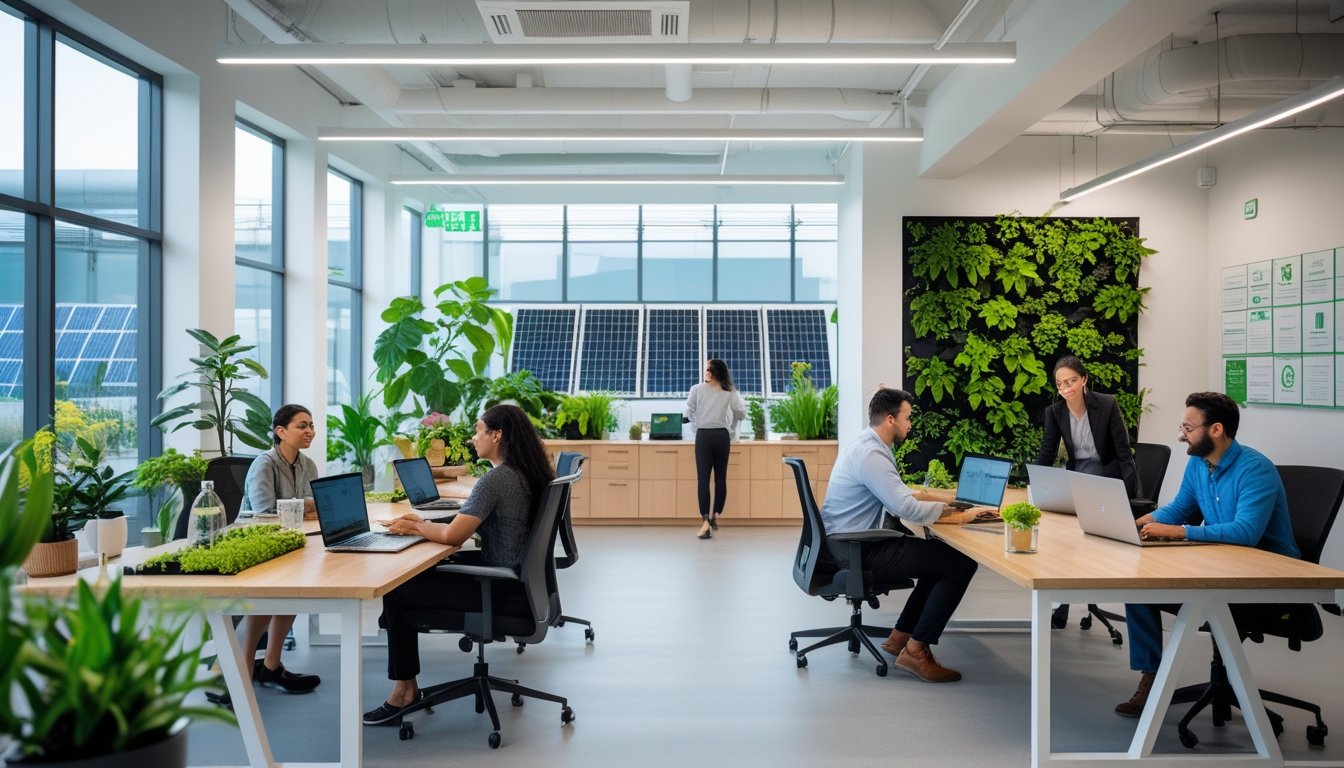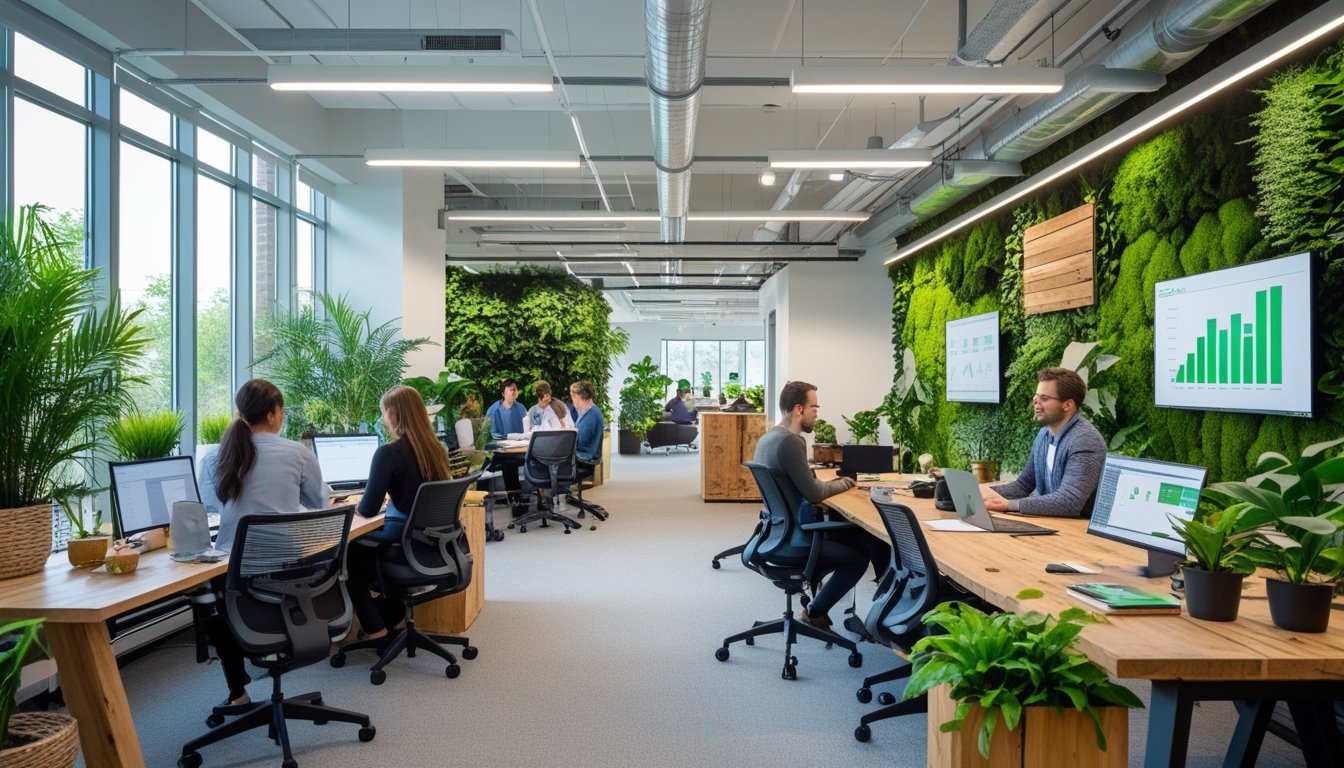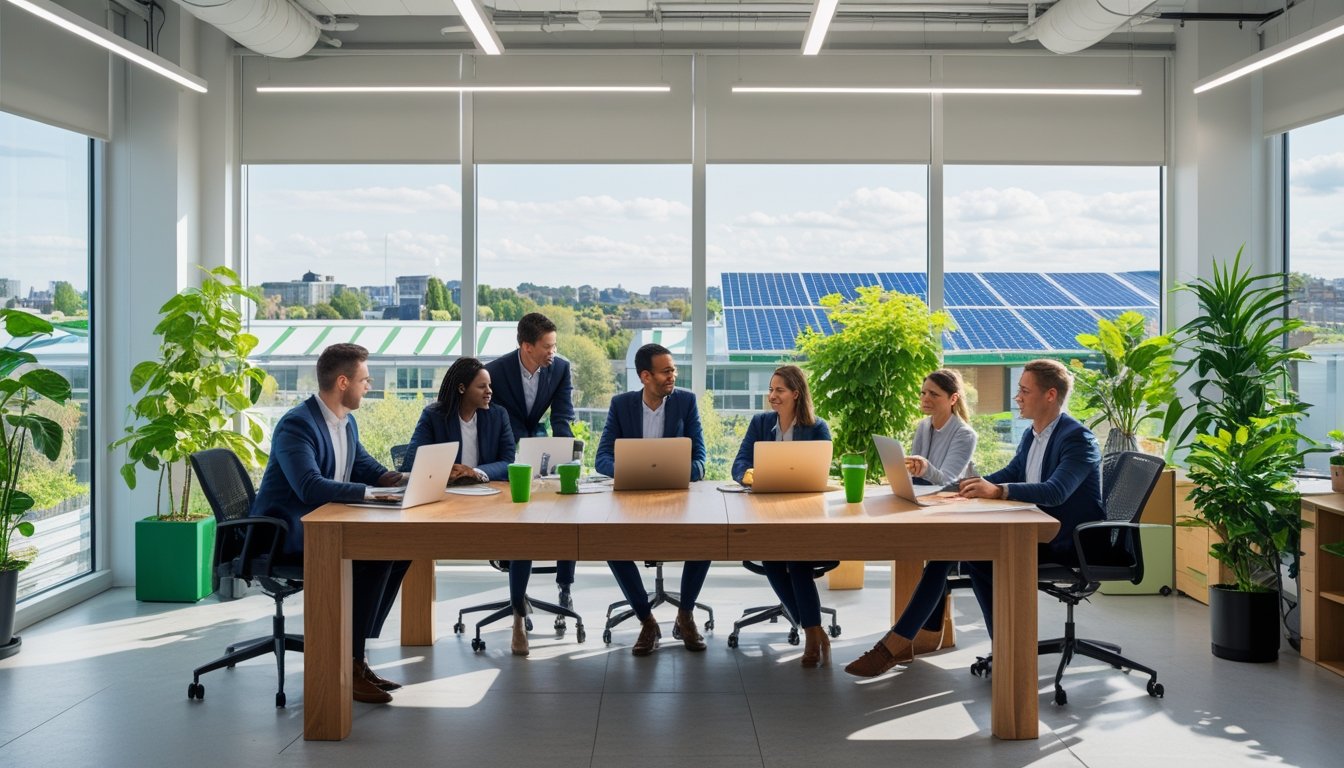Late updated: 30 Oct 2025 14:10
Written by: Amber Collins
Green Business Trends Shaping The UK Office Environment: Key Adaptations for 2025
As environmental concerns become more pressing, businesses in the UK are witnessing a significant shift towards sustainability. In 2025, the push for greener office environments is not just a fleeting trend but a vital aspect of modern business strategy. Organisations recognise that sustainable practices are crucial for the planet and enhance workplace efficiency and employee satisfaction.

Our commitment to creating eco-friendly workplaces involves innovative office designs and policies that prioritise employee well-being. Many companies are now adopting green-certified buildings and biophilic design elements, which have been shown to boost creativity and cognitive performance. By aligning with these trends, businesses can remain competitive while meeting their sustainability goals.
The landscape of UK business is continuously evolving, driven by regulations and a growing focus on employee experience. In the following sections, we will explore the forces shaping these trends and examine how companies are embracing sustainable practices in their day-to-day operations, transforming their offices into hubs of innovation and responsibility.
Key Takeaways
- Sustainability in the UK office is now a strategic business necessity.
- Green office designs enhance employee well-being and creativity.
- Modern regulations and workforce expectations drive sustainable innovation.
Sustainability Drivers in the Modern UK Office
In today’s UK office environment, sustainability is no longer optional. Businesses are implementing strategies focused on energy efficiency, integrating renewable energy, and adopting circular economy principles to reduce their carbon footprint and bolster environmental accountability.
Energy Efficiency and Carbon Reduction Initiatives
Energy efficiency is at the forefront of sustainability efforts in the UK office environment. We are seeing a significant push towards reducing energy consumption to cut down carbon emissions, a critical component to meeting national and global climate targets.
Smart technology, such as intelligent lighting and HVAC systems, is employed to automate and optimise energy usage. Many offices have adopted LED lighting which consumes less energy and reduces electricity bills.
Insulating office buildings can also play a crucial role in energy conservation. Improved insulation helps in maintaining consistent internal temperatures, thus lowering the demand for heating and cooling. As part of this drive, organisations are increasingly conducting energy audits to understand and address inefficiencies.
Integration of Renewable Energy Sources
Renewable energy is no longer just a concept; it's a definitive action point. Businesses are progressively integrating sources like solar and wind energy into their operations to decrease reliance on fossil fuels.
Installing solar panels on rooftops or in office vicinities allows companies to harness clean energy, thereby reducing electricity costs and carbon emissions. Some offices are even participating in renewable energy tariffs, purchasing their energy directly from green providers.
Transitioning to green energy often involves heat pumps to replace traditional heating systems. These devices extract heat from the environment, providing an efficient renewable heating solution that significantly reduces carbon footprints.
Circular Economy Approaches in Office Fit-Outs
Implementing a circular economy in office design promotes sustainability by emphasising reuse and recyclability. This approach aims to extend the life cycle of office materials and minimise waste.
We are seeing businesses prioritising sustainable materials for furniture and interior design, using recycled and repurposed components. Modular designs allow parts to be replaced or upgraded without discarding entire units.
Engaging in circular economy practices involves waste management strategies, like employing comprehensive recycling programs and encouraging a paperless environment. This not only cuts down on waste but also contributes to a more sustainable office atmosphere. Through these actions, the UK office scene is making noteworthy strides towards a responsible and sustainable future.
Innovative Office Design and Employee Well-Being

Our exploration into innovative office design highlights the impact of contemporary trends on employee well-being. By focusing on workplace transformation, biophilic design, smart technology, and accessibility, companies can create spaces that boost engagement, productivity, and employee satisfaction.
Trends in Workplace Transformation and Hybrid Working
In recent years, office environments have undergone significant transformation, driven by the rise of hybrid working models. Flexibility has become paramount, allowing employees to work both remotely and in-office seamlessly. Reorganising space to accommodate hot-desking and collaborative areas is essential.
This approach not only optimises real estate but also supports varying work needs. Incorporating flexible workstations and shared spaces strengthens team dynamics and ensures efficient use of resources. Emphasising natural light and sustainable materials enhances employee satisfaction and aligns with corporate social responsibility goals.
Biophilic Design and Living Walls
Biophilic design, integrating elements of nature into office spaces, has gained traction for its positive impact on mental health and productivity. Introducing greenery, such as living walls, promotes a serene atmosphere and reduces stress. Plants naturally filter air, improving indoor air quality and complementing efficient HVAC systems.
Use of natural materials, textures, and daylight access creates a more inviting workspace. These features not only improve employee well-being but also contribute to sustainability by reducing reliance on artificial lighting and air filtration. A thoughtful biophilic strategy enriches the working environment and enhances overall experience.
Smart Technology and AI Integration
The integration of smart technology and AI in offices is revolutionising the work experience. From automated lighting and temperature controls to AI-driven systems for managing space utilisation, these innovations promote efficiency and comfort. LED lighting can be adjusted for optimal visibility while conserving energy.
AI tools, such as virtual assistants, simplify routine tasks and improve communication. Through data analysis, smart systems provide insights into space usage and employee preferences, allowing for more informed decisions. This blend of technology fosters a responsive, adaptive work setting that supports well-being and productivity.
Accessibility and Employee Engagement in Green Spaces
Ensuring accessibility in office design is vital for creating inclusive work environments. Incorporating lifts, ramps, and clear signage promotes accessibility and transparency, which are crucial for employee engagement. Encouraging use of green spaces within and around offices offers rejuvenating breaks and fosters creativity.
Water-efficient fixtures and eco-friendly materials enhance these spaces, aligning with sustainability objectives. Engaging employees in the design process and providing feedback channels empowers them and builds a sense of ownership. Ensuring spaces are welcoming and accessible for all enhances morale and cultivates a more cohesive workplace community.
Frequently Asked Questions

Many UK businesses are keenly adopting sustainable practices in their workplaces. This includes environmental design improvements, the use of green technologies, reducing waste, and enhancing employee wellbeing. Let’s explore some common questions about how offices in the UK are integrating sustainability.
How are businesses in the UK incorporating sustainable practices into their office design?
UK businesses are increasingly choosing materials that are recyclable and reusable. Office layouts now often include natural light sources and plants to create a more eco-friendly environment. Many firms are also opting for flexible workspaces to minimise the need for large, resource-heavy office areas.
What are the leading green technologies being adopted in UK workplaces?
One prominent technology being embraced is energy-efficient LED lighting systems. Additionally, smart thermostats and energy management systems are gaining traction. Some offices are even installing solar panels to supplement their energy needs, highlighting the shift towards renewable energy solutions.
In what ways are UK companies ensuring energy efficiency within office environments?
UK companies are focusing on optimising energy consumption by using smart building technologies. This includes automated lighting and HVAC systems that adjust based on occupancy and time of day. Installation of energy-efficient appliances is another measure taken to reduce consumption.
What initiatives are UK offices taking to reduce waste and promote recycling?
Many UK offices have implemented robust recycling programmes and are using recycled materials whenever possible. They encourage paperless operations by adopting digital documentation. Offices also conduct regular audits to identify and minimise waste sources within their operations.
How is the wellbeing of employees being addressed through green office spaces in the UK?
Employee wellbeing is being enhanced by incorporating natural elements such as indoor plants and natural lighting. These environment-friendly features help reduce stress and increase productivity. Providing spaces for relaxation and ensuring good air quality are other measures being taken.
What are the legal requirements for UK businesses regarding environmental sustainability in the office?
UK businesses must adhere to various environmental regulations, which include waste management and energy efficiency standards. Companies are required to ensure compliance with laws such as the Environment Act 2021, which governs air and water quality and imposes waste reduction obligations.
